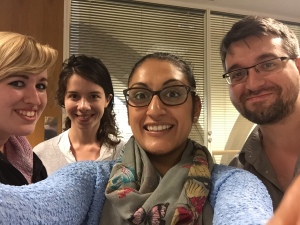
Writing a blog allows budding researchers to develop a network of peers and engage with the public, beyond the confines of academia. It offers a platform to hone writing skills and explore new ideas. However, for researchers at the outset of their career, there are a number of issues to consider before setting off. After attending a two-day workshop on Research Blogging in the Arts and Humanities, four PhD researchers voice their anxieties around blogging, and offer some advice on moving forward.
Starting a post!
Whilst we have material and ideas that we want to write about, it’s often difficult to establish where to begin and develop this into something coherent. At times, we automatically revert to the process of academic writing and structures. David McGuinness’ advice was to think of blog posts as ‘recapitulation’, as a way of focussing thoughts and ideas, but we’ve found that we first need a way of getting past the first hurdle.
What should I put online?
Perhaps behind this is the fear of the content itself – what we should and shouldn’t be putting online, how it reflects on us as academics and whether anything we publish now might interfere with our PhD thesis and future publications. We’ve had some contrasting advice about these issues from various speakers: some have suggested a very neutral tone, being careful to consider how a future employer might react to reading this material; others have advocated showing a bit more personality, using the blog to refine ideas, and not being afraid to be critical and air strong opinions.
Blogs can be used to show a thought process or work in progress, but putting out something ‘unfinished’ can leave us feeling vulnerable and open to criticism. In academia we wait until we know what we want to say before sharing, so spending time writing about the entire process might seem like a waste of time. On the other hand, this could help us see how we arrive at something more finished, and receive feedback to help shape our ideas.
Creating content
A good idea is to avoid writing directly about your research, but focus on tangential issues: interesting stuff that you’ve come across during your work, but won’t be part of your thesis. Sometimes this can help lead in unexpected directions in your future research, particularly post-PhD. This can also be a great way of building a wider audience for your blog. Emily Bowles has blogged about humurous asides that she has come across during her research, such as nicknames that she’s found for Dickens, or dodgy, hand-written poetry in the margins of old editions. Ryan McNutt recommends using current events and popular culture as a spring-board, not only keeping your material relevant, but helping to grow an audience.
Share your experiences and build a network
The Research Blogging workshop has really shown us that we’re not alone in the fears we’ve had in blogging our research for the first time, and the peer network that we’ve already built in the past two days will be invaluable. Sharing these concerns with other bloggers helps you find ways around your initial anxiety and offers insight into creating content and keeping your blog relevant. Also, try to remember that if you find something fascinating, someone else will be probably share your interest.
Authors: Aaron McGregor, Diljeet Bhachu, Kirsty Boardman & Cia Jackson

Reblogged this on diljeet bhachu and commented:
A collaborative blog post I co-authored as part of the research blogging training I mentioned last week!
LikeLike
Another way to think about blogs is to focus on the readers. To my mind blogs should be about communication rather than expression. So what would your readers like to share with you? What would surprise them, delight them, confront them, inform them or make them want to engage (positively interact) with you? Blogs require the type of judgements made during conversation (rather than letter writing or diary entries) and the skills of journalism: timeliness, hook, use of quotes to enliven your writing and include more perspectives on the topic (rather than just your opinion) and to be manageable amongst all the other posts and discussions competing for readers’ attention. You still need to edit it though. This has taken me 20 mins to write (I have a pile of resit marking beside me). I have also asked one other person to look at it and see if a) my meaning is clear and b) are my assumptions here unintentionally patronising or offensive. We had a good discussion which informed the re-writing and decided the point is starting a conversation and that always involves thinking about the person that you want to talk to even if they are virtual.
LikeLiked by 2 people
Thank you for this! It’s a really helpful way of looking at it. At the workshop we discussed keeping your readers in mind with regards to what you’re writing about (with particular reference to the ethics of blogging about real-life people) and thinking about our audiences but your comment really brings out what we need to keep in mind as we blog, and how that type of writing differs from academic writing. We hope you’ve enjoyed the posts so far!
LikeLike
It’s been making me think so I’m grateful. I’m about to take over one of our archive blogs and the previous bloggers had a very different approach to one I would feel comfortable taking. So I haven’t had the confidence to plunge in yet.
LikeLiked by 1 person
Pingback: Research Blogging: the First Hurdle | Phd-Girl
Reblogged this on aaronmcgregor and commented:
Collaborative blog post I contributed to at the Research Blogs in the Arts and Humanities workshop last week.
LikeLike
I would immediately and very clearly remove any distinction between research blogs and other blogs: there are good, informative, stimulating blogs, and bad ones. The interest for me is in their reaction to later publication in print. We now share the process of our thinking. I hope any platforms will embrace any blog, and not be limited to academics. They are a great open source device.
LikeLike